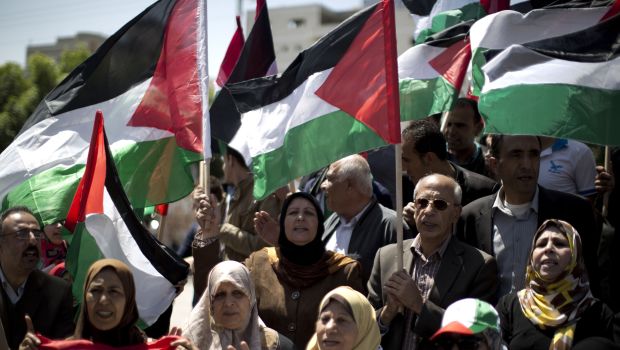
Palestinians take part in a demonstration in Gaza City on April 22, 2014, supporting a new attempt to reconcile the militant Islamist movement Hamas and its Palestine Liberation Organisation (PLO) rivals (AFP PHOTO /MAHMUD HAMS)
Tuesday’s meeting is perceived as the most senior-level summit between the two movements to be held in the Palestinian territory. Previous meetings were mainly held abroad, most notably in Cairo, Doha and Riyadh.
The talks aim to end the seven-year split between the two sides, which began after Hamas seized control of the Gaza Strip in 2007, expelling representatives of Fatah, following Hamas’s victory in the 2006 legislative elections. Since then, Hamas has controlled Gaza, while Fatah—under the banner of the Palestinian National Authority—has ruled areas of the West Bank not under direct Israeli control.
The Fatah delegation at the upcoming talks is headed by Central Committee member Ahmad Azzam and includes Al-Sha’ab Party secretary-general Bassam Al-Salehi, Al-Moubadara leader Mostafa Al-Barghouthi, and head of the Palestinian Arab Front Jamil Shehadeh, in addition to prominent Palestinian businessman Munib Al-Masri.
Moussa Abu Marzouk, Hamas’ official in charge of the reconciliation process, arrived in Gaza from Egypt earlier this week. He has since held meetings with Hamas leaders including former Prime Minister Isma’il Haniyyah to prepare for the talks.
Meanwhile, in a goodwill gesture, Hamas released 10 prisoners loyal to the Fatah Movement who were held on charges of “committing security violations.” Hamas’ Interior Ministry in Gaza said the prisoners’ release “aimed at bolstering the Palestinian reconciliation efforts.”
The Fatah delegation has a three-day deadline before returning to Ramallah to inform a meeting of the Central Committee on Saturday of the results of the talks.
Sources with knowledge of the agenda of the talks told Asharq Al-Awsat that a number of understandings were agreed by the two sides ahead of the Tuesday meeting, and added that the two sides agreed to focus on three issues: the government, new elections and the Palestine Liberation Organization (PLO).
The sources, speaking on the condition of anonymity, added that the talks would focus on forming a consensus government led by Palestinian President Mahmoud Abbas, which would be in office for six months to prepare for presidential and legislative elections, as well as elections of a National Council for the PLO at the end of that period.
One of the sources said: “If the two parties agree on these points Abbas will issue two decrees, to form a government and hold elections.”
The sources added: “Agreeing to implement the previous agreement is the aim of the [PLO] delegation, not starting new negotiations or changing the agreement.”
However, it remains unclear how negotiators will be able to make progress, as the positions of the two sides remain far apart on many issues.
Hamas wants to ensure that the issue of membership of the PLO’s ruling executive is resolved and is not in favor of speedy elections, and links them to agreement on the issue of political liberties. Fatah, however, wants to go directly to elections after the formation of an interim government, to enable the winner of the elections to administer both the West Bank and Gaza.
Fatah’s internal politics have grown increasingly fractious in light of a possible confrontation with Israel if the US-sponsored peace negotiations fail. Hamas, in contrast, faces increasing pressure thanks to regional developments which have worsened its political and financial problems, such as the closures of the border with Egypt and the ban on its activities there.
The prime minister of Gaza’s Hamas government, Ismail Haniyeh, said on Monday that his movement was committed to all previous agreements it had reached with Fatah.
Haniyeh, speaking at a news conference in Gaza, said: “We confirm our commitment to all previous reconciliation documents which were agreed and signed, and confirm our commitment to work in partnership together in order to implement the five dossiers of reconciliation—the government, elections, PLO, public liberties and social conciliation—as one package.”
If the conciliation succeeds, the Palestinian president will immediately announce the formation of a new unity government for the West Bank and Gaza. If it fails, the Central Committee of the PLO will discuss on Saturday the possibility of holding elections without Hamas’ participation.
Meanwhile, tension has been rising on the Israel–Gaza border, after five rockets fired from Gaza landed in Israel, resulting in Israeli retaliation with a series of air raids.
Israeli Defense Force spokesmen said on Monday its aircraft attacked targets in southern and central Gaza in retaliation to the rocket attack on western Negev, and the firing of an RPG at a military patrol near the border.
Medical sources in Gaza said two Hamas members were injured by a bombing carried out by Israeli military jets on a Hamas security center in Nusairat camp in central Gaza.
